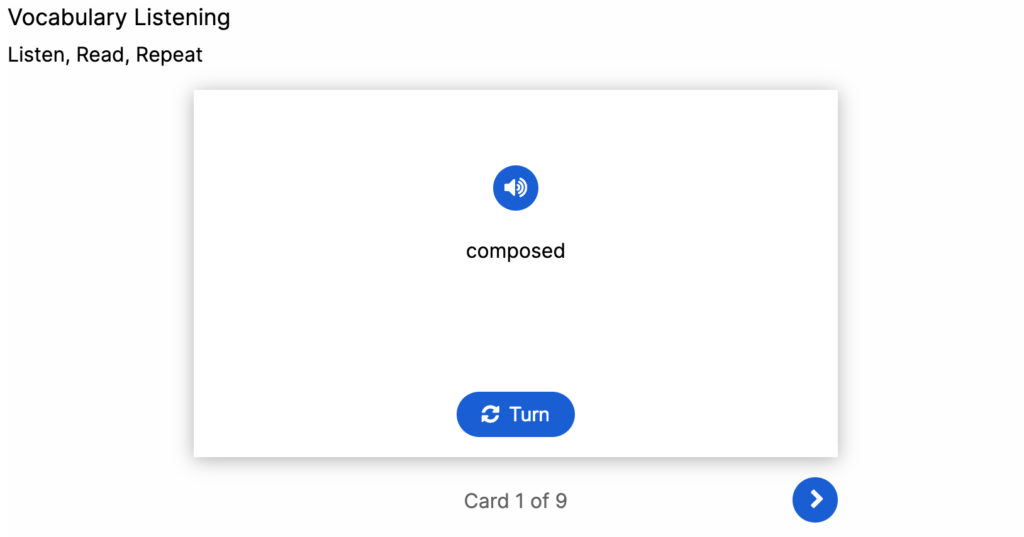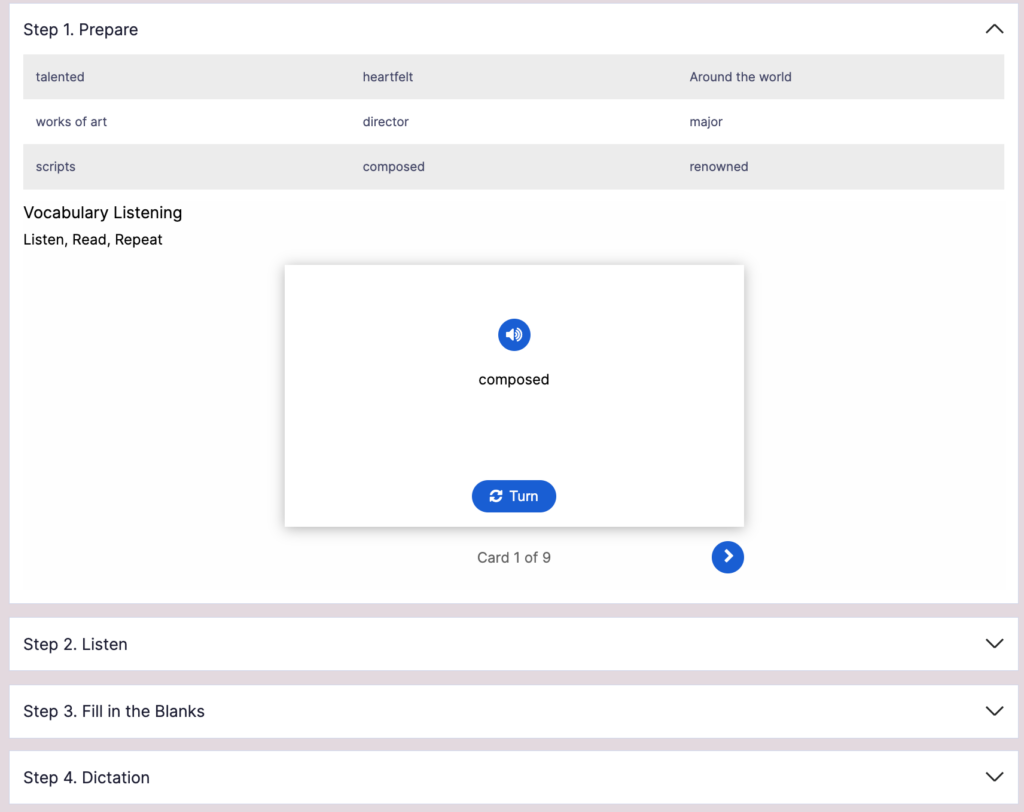I’ve been building out this app on the H5P framework on WordPress and basically designing and creating all aspects of this app so I’ve come to a point where I need to write this down to sort things out because everything seems foggy in my brain. Especially with almost no feedback (other than testing it out) or people to discuss this with. The clarity runs dry when there’s too much thinking and less doing. So here’s me writing it out hoping for clarity to hit me like a lightning bolt as I jot down ideas.
And no, I still have not set up success metrics but more on that later.
To cloze or not to cloze
After I got rid of the multiple choice comprehension questions, the input requires solely to improve listening skills. Instead of testing students for comprehension, I’ve decided to cover that aspect prior to the listening activity in the form of these flashcard dialog boxes

I wasn’t sure what was the best way to present this in the learning flow other than to have students take it upon themselves to listen and go through the flashcards, hence why I wasn’t sure if it would be better to have Japanese front-facing or English. I talked this over with the English department head and he raised some very interesting points.
Particularly that students at lower levels of English should be learning to spell the “basic” words (high, low, good, bad etc.) versus high school students at (hopefully) higher levels of English should be merely recognizing the word and the meaning of the word. They do not need to bother themselves with the spelling of words such as appropriate or embezzle lmao. There’s no need for them to write so having English front facing would not be as important.
I told him then, that after going through the words in the dialog boxes students would then have to do a cloze exercise (fill in the blanks) and this would require them to know the spelling.

So I’m currently processing this bit of new information from my Department Head.
Is this a fallacious line of thought? Does knowing the spelling only help them when writing? or does it help them read too? And if it does help their reading comprehension, then to what degree? What are the trade offs to applying processing power to learning spelling while trying to improve listening abilities?
Clearly they are not native speaking kids so the idea that “all linguistic skills are important at all times” is a utopian pipe dream and disregards context in that EFL students in Japan don’t actually need to exercise all linguistic skills at all times. Even at extremely high levels of academia for students, their output in English is minimal unless they’re writing dissertations.
That being said, the learning flow allow them plenty of leeway in which they can reference and learn the spelling, so I would hope that friction to learning is not too high, but if they do end up copy/pasting the word into the cloze boxes, is it detrimental instead?

So the question is, should I set up more lax parameters for spelling mistakes in the cloze activity? Or should I insist that they learn the spelling in the interest of improving reading comprehension? Is that the right question to be asking? Lol perhaps it may be more beneficial to ask myself what kiku is meant to be doing.
What is kiku meant to be doing?
At its core, I’ve devised kiku as a study aid. To help students practice listening in a structured and forgiving manner so as to allow students to fail multiple times rather than being evaluated repeatedly by arbitrary standardized tests that provide no actionable feedback other than “you’re terrible, give up now”. Fundamentally, I think the problem exists because EFL teachers in Japan don’t know how to teach listening, nor do they know how to assess listening skills.
Kiku is meant to address these holes in our EFL methods of teaching. It separates comprehension from actual listening skill, requiring students to build comprehension all the while requiring a repetitive listening exercise to build the capacity to identify sounds.
Actually, I think therein lies my answer. Building comprehension while requiring repetitive listening.
Spelling doesn’t really build anything in regards to listening or listening comprehension. It offers improvement with reading comprehension over time (literacy skills) but has diminishing gains as learning friction gets in the way of listening progress while carrying out dictation and cloze tasks.
Anyway, good talk.